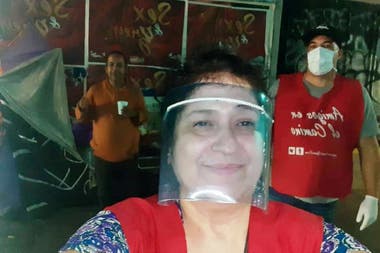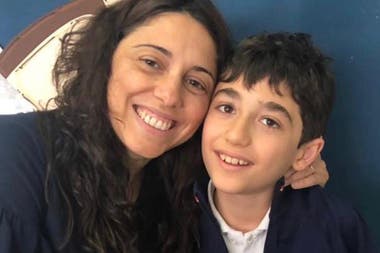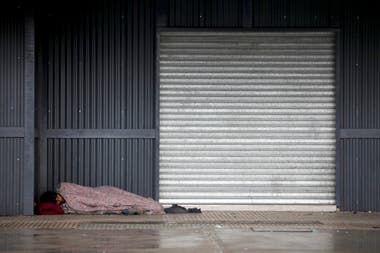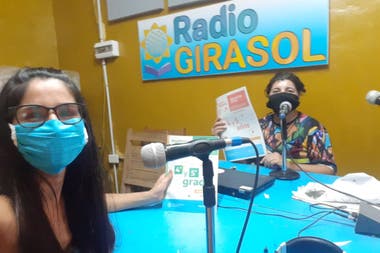Monica De Russis is president of the civil association
Friends on the Camino
, one of the few social organizations that, in the midst of the pandemic by COVID-19,
still makes night tours of the City to help people on the street
. As a testimony to what they see every night, they share videos on their networks, where men and women talk about lack of assistance, hunger and fear due to the impossibility of protecting themselves. They are the most excluded and exposed part of the population: the homeless, those thousands of Argentines who do not even have a place to comply with the mandatory quarantine.
“I
I can go to sleep quietly knowing that in a corner there is someone who has nowhere to sleep or what to eat
And who is at risk? “asks Monica. Amigos en el Camino is part of a group of various community aid organizations that regularly go out and walk the streets of the city of Buenos Aires to deliver meals and provide other assistance, but
very few were able to maintain night outings during isolation
. Monica and her team decided to continue, although with a very small group and another dynamic: instead of going out from Monday to Friday with its almost 120 volunteers divided by days, only five volunteers do it, visiting different neighborhoods in one or two cars. “Two people per vehicle and on different circuits”, explains Mónica, as a form of care.
During the quarantine, Amigos en el Camino continues to tour the City to accompany people on the street
01:25
Since many of those who make up
Friends on the Camino
they are, in turn, part of the risk groups, they help from their homes, preparing food, boiling eggs and putting together hygiene kits. Since the pandemic was decreed and the mandatory isolation, they have taken extreme care: they keep their distance and clean all the time with gel alcohol and alcohol vaporizers. In addition, Monica says that
Two days ago, for the first time, they used plastic masks made by a colleague with recycled bottles.
.
“We continue despite the risk because the anguish caused by seeing between 120 or 300 homeless people is greater, depending on the neighborhoods we come to visit,” he says. For their task, they have the circulation permits granted by the City Government.
Last Tuesday night they were on the streets of San Cristóbal, Montserrat, Constitución and San Telmo, where they saw more than 120 people. And yesterday, the same amount in Parque Centenario, the Durán hospital area, Agronomy and Chacarita
.
Each of the “friends” -as Monica calls them- with whom she was this week, posed similar situations:
“Everyone was hungry for not having eaten and the complaint was that the truck from Buenos Aires Present (BAP) did not pass to give them food and hygiene items”
. Many, also, before the arrival of the cooler nights, asked for blankets.
According to the last census carried out by the Buenos Aires Government, in April 2019, there were at least 1146 people on the street. However, the number managed by civil society organizations today is almost seven times higher: 7,251 people, of whom 871 are children and adolescents.

Solidarity Roads
It is another of the organizations that make up the Network and usually makes tours, although at this time it does not come out. Its president, Mariela Fumarola, warns that “the situation is very complicated, there are many who do not have places to be or eat.
And line 108 is overflowed, no matter how many new places were opened
, such as the Parador de Parque Chacabuco.
They are not enough, they are out of date
In this scenario, Mónica De Russis adds that “the BAP response is late. In some cases, more than four or five hours passed and in others they did not go. “Therefore, one of his main requests is that public policies be more effective.
The head of the Ministry of Human Development and Buenos Aires Habitat, María Migliore, emphasized that
“the main objective is that there are no people on the street during the coronavirus quarantine”
, and assured: “We are redoubling our efforts so that all people have a place to stay, to sleep, eat and be more protected.”
The ministry reported that, as a result of the health emergency, in the last week they enabled seven new inns with 780 beds, in addition to the 2100 arranged in the 33 Social Inclusion Centers that are distributed in the different neighborhoods.
“This allowed Tuesday, March 31, more than 680 people in a street situation to enter the paradores,” the Buenos Aires organization detailed. In addition, they assured that they have strengthened the care teams of line 108 and that 100 BAP people walk the City at night “to help those who do not want to go to the paradores.”
Today, when many at home are preparing to go to sleep,
Monica
, who is 55 years old and has been touring the City for 10 years,
will go out again with other volunteers
. For her, reaching out to those who need it most is crucial. He believes that the most important thing is to create a link with the people who visit, to know them and to try to help them, without judging them, even more now, with the threat of the coronavirus.
How to help?
Friends on the Camino:
they need masks, protective masks, gloves, fine alcohol, gel alcohol and bleach. In addition, they launched a permanent campaign of hygiene kit: they can be bought
10 kits
,
30
,
60
or
100
. The organization deals with picking them up by the provider and delivering them on the tours. In
Facebook
You can learn more about the work they do. To contact [email protected]; tel .: (011) 15-5838-7458
Other organizations that assist street people and ask for collaboration
FURTHER
.
Publicado en el diario La Nación




